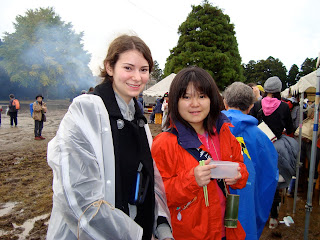Yesterday I returned to the same grilled chicken restaurant that I went to with Otousan a few weeks ago, but this time with a friend. I learned last night that I have no etiquette when it comes to eating yakitori, or grilled chicken. Last time I went, I just picked up the stick with the meat on it and ate the meat off of the stick. But last night, my friend gave me chopsticks to use, and I had no idea what to do. Apparently, one is supposed to take the meat off of the stick using the chopsticks, place the meat on the plate, and then eat it. I proceeded to take off the three pieces of meat from the stick and place them on the plate. Then my friend said, "You're supposed to take off only one piece of meat at a time, or else it's bad manners!" I also piled up the wooden sticks on my plate after removing the meat, but my friend told me to place the wooden sticks in a cup sitting on the edge of the table.
Last Sunday I had my second music rehearsal with my host cousin who lives across the street. We rehearsed the same four pieces we worked on last time, but everything sounded better this time, so I was pleased. I think my host mom is hoping my cousin and I can perform the pieces at a Konan University event someday, but I still become nervous when I perform, so we'll see. My Culture and Education course professor also requested that I play the violin at a college campus that our class will be visiting in a week and a half. He said that at the school when everyone is partaking of "high tea" it would be nice to share some of the exchange students' talents and interests.
Finals season is coming up. It unfortunately lasts for about three weeks here, as opposed to one week in the U.S. I start tomorrow with an in-class essay exam for Japanese language class, and things continue from there through December 22, when winter break begins. Japanese students don't start winter break till December 24th or 25th, so I consider myself lucky.









